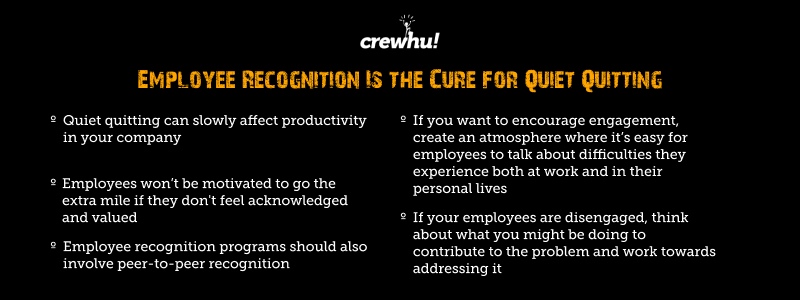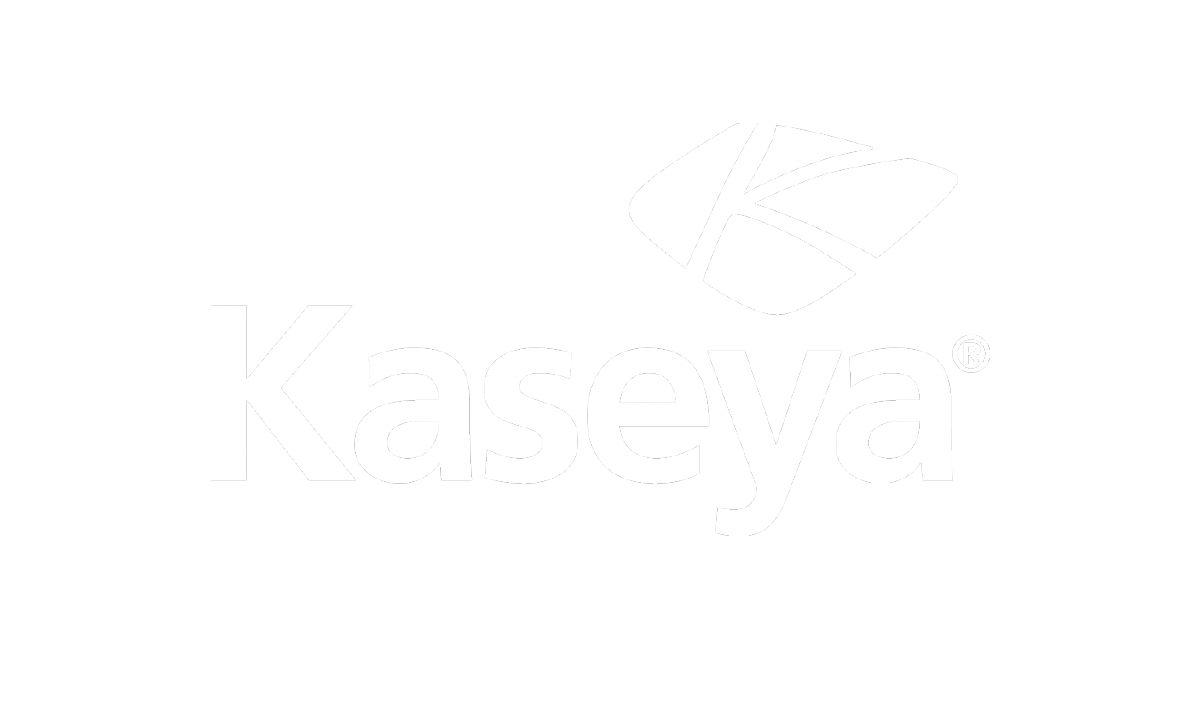Employee Recognition Is the Cure for Quiet Quitting

Employee engagement is one of the pillars of a successful business. Acknowledging employees for their hard work will improve job satisfaction and reduce the cases of quiet quitting.

As a manager, it’s easy to observe employee disengagement when workers start to leave. But what about when they don’t quit outright, but gradually lose interest in their jobs?
Although they show up on time and do what’s required of them, they’re not motivated to go the extra mile. They keep ideas or opinions that could help the company to themselves and only do the work they’re paid to – nothing more.
This phenomenon is known as quiet quitting. Employees who don’t feel recognized and appreciated at work aren’t inspired to be the best versions of themselves, and that can affect the success of your operations.
So how can you minimize cases of quiet quitting? By prioritizing employee recognition programs. In this article, we’ll show you simple-yet-actionable ways of promoting employee satisfaction and keeping your workers engaged.
Make employee recognition a part of your company culture
Employee recognition shouldn’t be something you do only when the need arises. It should be a fundamental part of your company’s culture. Of course, your company culture reflects your vision as the owner, but if all of your employees aren’t involved, you won't be able to reach your goals.
Quiet quitting is one of the enemies of successful company culture. And you can fight it simply by showing employees that you interested in their welfare and value their contributions. When employees feel like they’re important to you, it will show in their attitude at work. They’ll be encouraged to do more to impress you.
Encourage peer-to-peer recognition
Another way you can put an end to quiet quitting is through peer-to-peer recognition. Most employees love appreciation from the boss, but they also enjoy recognition from their colleagues. Apart from the fact that peer-to-peer recognition builds team spirit, it also makes employees feel valued.
Knowing that their team members value their hard work can give your employees a feeling of accomplishment that translates into job satisfaction. And it’s easy to create avenues for workers to show gratitude to each other.
During staff meetings, set aside some time for employees to share what they like about each other. And encourage them to frequently write thank you cards to each other for a job well done. This is an easy way to ensure that recognition spreads throughout all levels of the company and doesn’t focus solely on employer-to-employee relationships.
As an added bonus, when some of these workers eventually become supervisors and managers, employee recognition will come more easily to them and there will be fewer cases of quiet quitting in your company’s future.
Personalize gifts
Let’s face it – you’re likely to appreciate a gift more if you realize it was prepared with you in mind. It might not even be an expensive gift, but it will be valuable to you. Extend this same feeling to your employees.
Too many employees feel like their bosses only care about the work they do, and nothing else. Giving them meaningful gifts can let them know that this isn’t the case at all. It can be something as simple as a handwritten thank you card or a pot with their favorite flower. What matters is the thought that tells your employees that you know them as people beyond the roles they play in your company.
If you don’t know much about your employees, don’t worry. You can simply conduct a survey with fun questions for them to answer. This way you can accomplish two tasks at once. First, you’ll be creating an opportunity for your staff to have fun, which increases engagement. And also, it will give you a chance to learn more about them.
Promote effective communication between managers and employees
One of the ways you can identify a disengaged employee is through effective communication. Encourage supervisors to have chats with staff at all levels.
Quiet quitters might be hard to spot because they are doing their jobs. They just have no motivation to put in any extra effort or to grow. Hence, the need for regular conversations, which can also keep you abreast of what’s going on in their lives and help you build stronger relationships.
You should be careful, though. Don’t limit conversations to work. Ask them about what's going on in their personal lives. This will open the way for deeper conversations and help employees become more confident about speaking about their struggles at work.
Avoid overworking your employees
Running a business can be stressful because there’s always so much work to do and never enough time. Piling more work on your employees might look like the answer, but this is the recipe for burnout.
Employees can’t give their best if they’re exhausted and stressed. One way to manage employee burnout is by allowing staff to work from home when possible. Also, create time for self-care activities and family time. Promoting a healthy work/life balance can help your employees recharge and stay motivated.
Let CrewHu help
We’ve seen how employee recognition can help you keep your workers engaged and reduce cases of employee disengagement. However, if you’re looking for a platform that specializes in taking your employee recognition program to the next level, then CrewHu is your best bet.
By working with us, you’ll be able to reward performance and achievements by collecting employee feedback. We'll design employee recognition strategies with your company in mind. Book a demo today to learn more.






